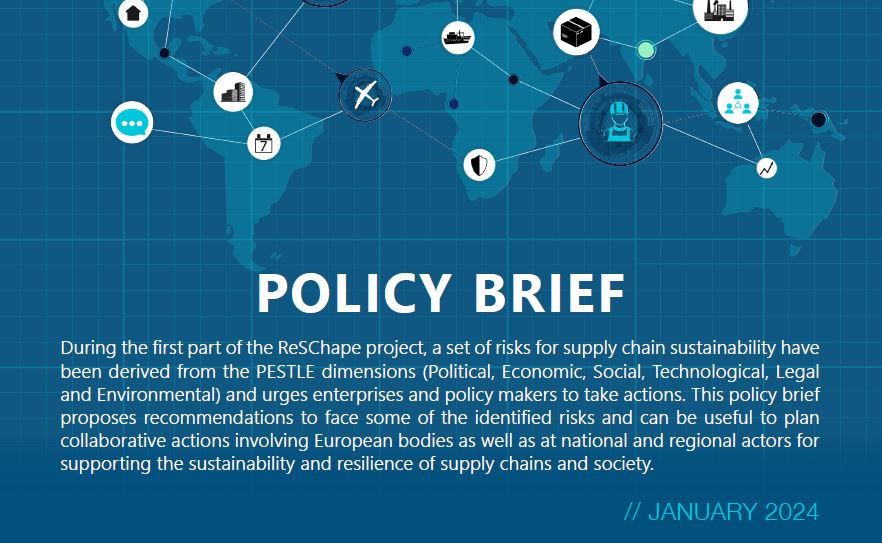ReSChape new Policy Brief
ReSChape has released its first Policy Brief which includes the preliminary policy recommendations of the project.
In its first year, the ReSChape team pinpointed various risks to supply chains stemming from trends and megatrends associated with the PESTLE dimensions. These risks call for action from businesses and policymakers. Recent global events like the COVID-19 pandemic and conflicts in Ukraine have severely disrupted supply and demand chains. Inflation, cost-of-living issues, and environmental challenges such as climate change and resource scarcity have compounded the difficulties. Social advancements and the digital revolution are pushing companies to strike a balance between technology-driven and societal approaches. All these factors significantly impact global supply chain performance, necessitating a thorough assessment of trends and risks by enterprises and regulators.
To address these risks, this Policy Brief puts forth a series of recommendations to enhance the sustainability and resilience of supply chain processes. These recommendations focus on Workforce and social sustainability, Infrastructures and technologies for social and environmental sustainability, and Environmental sustainability and Circular economy. They are multi-faceted and can lead to operational improvements in supply chains, involving stakeholders from ecosystems, society, and policymakers. These recommendations can guide collaborative efforts involving European, national, and regional entities to bolster the sustainability and resilience of supply chains and society.
The Policy Brief highlights the importance of policymakers in addressing skill gaps, promoting responsible business practices, and ensuring healthy work conditions. Policymakers can facilitate reskilling and upskilling of workers through collaboration with companies and educational institutions, promoting lifelong learning, and encouraging flexible working conditions. It is also crucial to integrate automation and digitalization in a human-centric manner.
In terms of infrastructure, policymakers need to address risks related to both physical and digital infrastructures. Challenges include city saturation, inefficient physical infrastructures impacting logistics efficiency, data sovereignty, and the need for federated digital platforms for manufacturing and logistics. Ensuring the safety of personal and confidential data, especially with the rise of AI, is another critical concern.
The Policy Brief also outlines risks related to the environment and the implementation of circular supply chains. Challenges include limited alternative energy sources, lack of information sharing on environmental issues, improper handling of products during their life cycle, and the need for technologies to manage end-of-life products effectively. Addressing these challenges is crucial for sustainable development and social responsibility.










